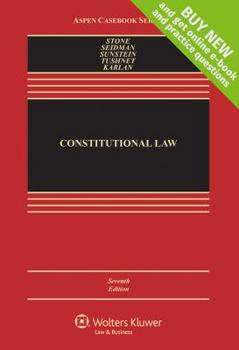Constitutional Law
Select Format
Select Condition 
Book Overview
Buy a new version of this Connected Casebook and receive ACCESS to the online e-book, practice questions from your favorite study aids, and an outline tool on CasebookConnect, the all in one learning solution for law school students. CasebookConnect offers you what you need most to be successful in your law school classes - portability, meaningful feedback, and greater efficiency.
A unique multidisciplinary approach characterizes the leading Constitutional Law. A variety of critical and social perspectives draw on political theory, philosophy, sociology, ethics, history, and economics to give a contemporary look at constitutional law within its traditional doctrinal structure. A mixture of lightly and more heavily edited cases allows close analysis while providing a broad array of important opinions and pivotal cases. Extensive material summarizes the state of the law and its development. Constitutional Law ideal for two-semester courses follows a logical two-part organization, beginning with the balance of powers among the Supreme Court and local, state, and federal governments and moving to the rights and powers of individuals. The excellent coverage of First Amendment law is clear and concise, and a distinct annual supplement separates First Amendment materials from the rest for ease of research.
The Seventh Edition presents new material on originalism and the right to bear arms; incorporation and the Second Amendment; and Libya and the War Powers Resolution. Full, analytic treatment of the Supreme Court's decisions in the Affordable Care Act is presented. Coverage of the preemption doctrine is expanded. A new discussion of the Religion Clauses' treatment considers church autonomy in light of Hosanna-Tabor. The text on freedom of expression has been revised to incorporate new cases such as Citizens United v. Federal Election Commission (on campaign finance regulation), Snyder v. Phelps (on intentional infliction of emotional distress), Brown v. Entertainment Merchants' Ass'n (on violent video games), FCC v. Fox Television Stations (on expletives in broadcasting), and United States v. Alvarez (on criminal liability for lying about receiving medals of honor.) New material on privacy and the Internet brings the Seventh Edition completely up to date.
CasebookConnect features:
ONLINE E-BOOK
Law school comes with a lot of reading, so access your enhanced e-book anytime, anywhere to keep up with your coursework. Highlight, take notes in the margins, and search the full text to quickly find coverage of legal topics.
PRACTICE QUESTIONS
Quiz yourself before class and prep for your exam in the Study Center. Practice questions from Examples & Explanations, Emanuel Law Outlines, Emanuel Law in a Flash flashcards, and other best-selling study aid series help you study for exams while tracking your strengths and weaknesses to help optimize your study time.
OUTLINE TOOL
Most professors will tell you that starting your outline early is key to being successful in your law school classes. The Outline Tool automatically populates your notes and highlights from the e-book into an editable format to accelerate your outline creation and increase study time later in the semester.






